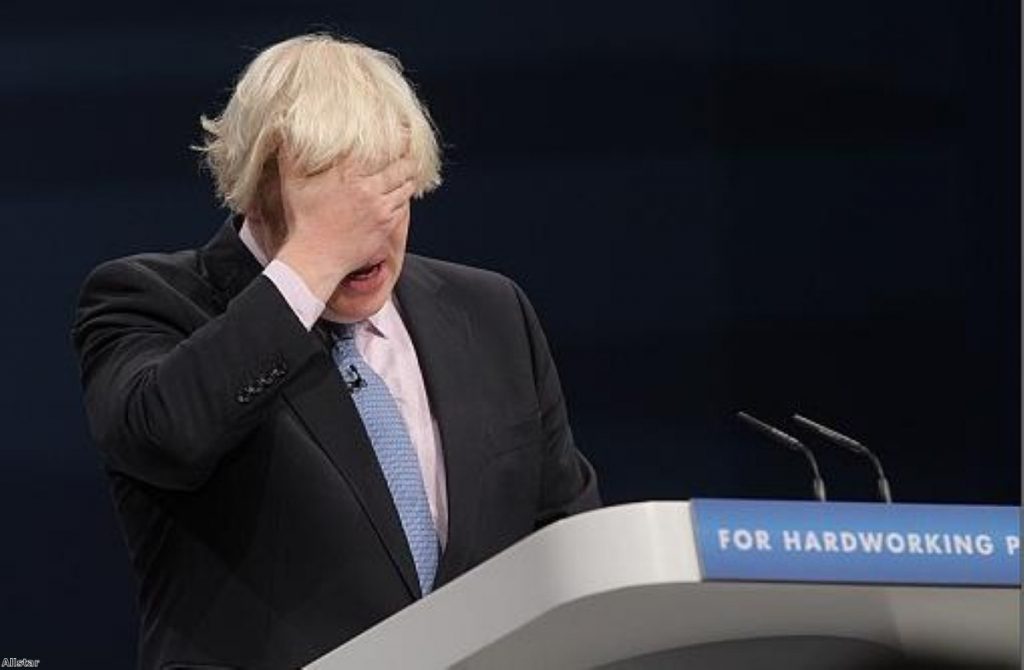No Boris, driverless trains are not about to save us from Tube strikes
Boris Johnson was elected as London mayor on a pledge to "deal once and for all with endless Tube strikes" in the capital.
The then Conservative candidate promised to "negotiate, in good faith, no strike deals with the Tube unions to end the disruption caused by unnecessary strikes".
However, rather than 'dealing once and for all' with the issue, the number of Tube strikes in London has actually gone up since the apparently bad old days of Ken Livingstone.
And rather than securing a 'no strike deal' with Tube union leaders, Johnson has not even met once with them in order to do so. In fact in the past eight years he has had more meetings with Lily Allen and Sol Campbell than he's had with tube union leaders.


Whenever his failure has been put to Johnson, he has replied that he is investing heavily in so called "driverless trains" to ensure Tube strikes no longer cripple the capital. The London mayor was at it again this week, giving Londoners the impression that he is about to unleash an army of robot trains to save the capital from its now regular strikes.
Boris Johnson's election leaftet from 2008
But does this impression have any basis in fact? Last year, leaked plans by Transport for London revealed that they don't expect automatically operated trains to be fully operational until the late 2020s. In order for the Tube network to be fully 'driverless' would require entirely new trains, doors on all platforms and a massive refurbishment programme that will take decades rather than years. Even if everything goes to plan, neither Boris nor his next two successors will be in office to see it in operation.
And even when the plans are implemented, the resultant network would not be truly driverless. Automatic Tube trains would still require 'train captains' on board to override the automatic operations in emergencies as well as to ensure passenger safety. A large proportion of the London Underground is actually above ground and poor weather conditions and other obstacles mean human staff would still need to be present on any supposedly 'driverless' network. A similar role to tube 'train captains' already exists on the Docklands Light Railway in London. These staff are mostly represented by the RMT, just like most Tube drivers. And just like most Tube drivers, these train captains can and do strike.
And there's also the small matter of the hundreds of staff working on the platforms and inside the Tube stations themselves. These will not be eliminated by automatic trains and will be just as able to strike as they currently are. Unless Boris plans to replace all human Underground staff with an army of unpaid robots, the era of Tube strikes is likely to continue long after he has moved on.

Tube strikes set to continue for decades to come
As long as Tube workers are legally allowed to strike, then there will be strikes. And of course it is on this final point where Boris and the Conservative government are far more likely to get their way. Under the current Trade Unions Bill, turnout thresholds are set to make it much harder for Tube unions to launch strike action. New analysis by Professor Ralph Darlington of Salford University reveals that most of the strikes launched by unions on the London underground since 1997 would not have been legally allowed to take place under the new legislation.
Yet even here, they could be disappointed. Higher turnout thresholds will only curb rather than 'deal once and for all' with Tube strikes. Some strike ballots will fail to meet the threshold but many will not. In fact the only way to truly eradicate industrial action on the Tube is is to ban strikes altogether. This would be a massively authoritarian measure and it is one which is being openly called for by at least one Conservative mayoral candidate.
But even if you think banning people from withholding their labour is an acceptable thing to do, for the time being it remains completely off the table and we are left instead with Boris's dream of a fleet of robot trains about to whisk us away from Tube misery.
And with Johnson about to depart from City Hall next year, it's a dream that Londoners would be wise to wake up from.









